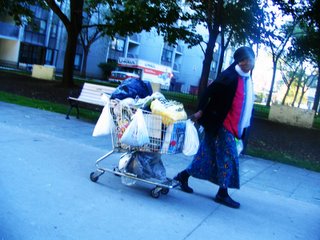False Consciousness and Authentic Cheer

I used to know in my bones what justice was, but in Berkeley I find myself surprised several times a day – especially by street people but sometimes even by myself. I no longer know when one should feel entitled or when grateful. Yet the poorest people seem to know those things quite well.
There are far too many ragged street people here now. Probably it’s mainly a reflection of the growing gap between rich and poor in America. Or the poor may be particularly attracted to Berkeley. I would choose this place if I were poor, if only because one can sleep out of doors without freezing. In part it’s also a continuation of the change that occurred 35 years ago when the mental hospitals were shut down and the patients were given drugs and sent out to fend for themselves. Many people in Berkeley still mutter to themselves or to passersby. Unlike the perfectly normal unemployed men who used to come to our back door for handouts during the Great Depression, these people could not slip back easily into conventional society if they were given a job. They can never again perform any work, if ever they once could. They beg.
I think there are different communities of beggars. The ones on Telegraph Avenue seem younger than those on Shattuck. They spend their time in packs and I feel a little fear when I pass them. Those on Shattuck are different. Although I haven’t seen any prosperous Berkeleyan contribute a cent to anyone on either street, the Shattuck Avenue beggars seem strangely satisfied. They sing, chant indecipherable phrases, or call out cheerful greetings indiscriminately.
I haven’t given money to anyone either, which I would have done in Toronto. If a Shattuck Avenue beggar asks for help, I say “sorry.” He replies, “No need to feel sorry. God bless you. Have a wonderful day.”
Today I said no to a Shattuck beggar who was overtaking me on the sidewalk. Next we both approached an old white haired blind lady who had probably been middle class, for she didn’t look like a street person at all. She had a white cane and asked for help. The man was ahead of me now and if I hadn’t just turned him down, I might have stopped to give money to the woman. I did not — but he did. Who was entitled to what? Why did he contribute when I did not? And am I questioning his attitudes or my own?
Certainly I have had to question my own attitudes yesterday and today. I stole a newspaper yesterday and tried to help a woman steal a paper today. Both of my actions astonished and puzzled me. Yesterday when buying cappuccino, I asked for lots of quarters; the New York Times requires four quarters per copy. Then I put my cup down on the outdoor table and approached the machine warily. On the previous day a different Times machine had kept one of my four quarters without opening up for me, so I didn’t trust this one. I was going to jiggle it before putting my money in – but it swung wide open at the slightest jiggle. I took out a paper, paused to consider whether to put money in or not, and decided against it. But I spent the rest of the afternoon wondering why I had stolen the paper. I have no sense of entitlement, no resentment toward the Times for past injustices. I would not have taken the paper from an unattended bundle on the sidewalk. (I am certain because I did indeed walk past such a bundle a few days ago without feeling any temptation.)
And this morning I wanted a Chronicle. Having duly fed the machine two quarters and opened it up, I saw a woman behind me, waiting her turn. This time I held the door open for her to steal a copy. She did not. In fact, she seemed puzzled by my gracious gesture. I shut the machine and went to my cappuccino, feeling more confused than embarrassed. Today’s near-theft was different from yesterday’s real theft. This time it sprang from a desire to be polite. On the front door of my Toronto apartment building there’s a sign warning us not to let strangers come in behind us. Nonsense. I will always let a stranger in! I will never shut the door in her face! To be sure, my sense of obligation does not require me to steal or encourage others to steal, but if the same situation arises tomorrow I’ll feel ashamed if I don’t hold the machine open.
Entitlement and gratitude. Those poor street people have nothing. Marxists would approve if the lumpenproletariat developed class consciousness and started resenting the society that excludes them. Yet these people show exuberance and gratitude, even in the absence of anything to be grateful for. In this regard I think they have achieved something remarkable that I want to learn for myself.
I sat down on a bench by the sidewalk and a young woman came up and sat facing me. “Hi,” she said, smiling. “How are you today?” I said fine, but I felt guilty. I should have said Hi first. She was entitled to that much. Maybe more. Should I have offered to help her steal something? Of course not. But I’m feeling class resentment for her vicariously. What is the appropriate way to wage a class struggle vicariously?



0 Comments:
Post a Comment
<< Home